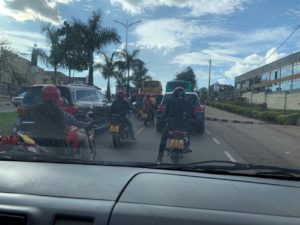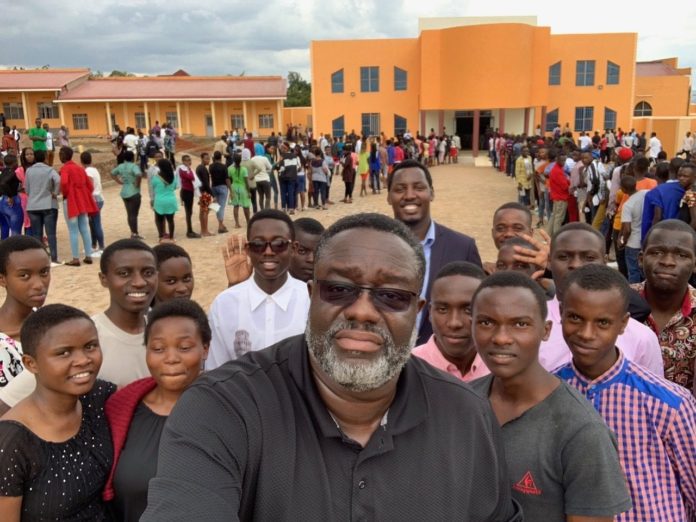(The Rev. Noel G. L. Hutchinson Jr., mission director for the Progressive National Baptist Convention), visited Rwanda from December 3-8 for a leadership conference with 200-plus pastors from throughout the African country. A keynote speaker, the Memphis-based organizer of Greater Works Fellowship, taught and preached and decided to blog/vlog along the way. In this installment, he seeks to “connect the dots.”)
RWANDA — …In conversations before this trip (to Rwanda in Africa), many people expressed great interest in going. Some of this, however, was co-mingled with fear and misguided curiosity.
“I heard it’s real expensive to go.” “Will I be able to eat the food?” Those are some of the things said to me as I prepared to leave.
I understood the statements and the questions. Africa was painted for centuries as “the Dark Continent,” a place full of mediocracy, savagery and great poverty. Often, we heard this without context, for we never heard of the great universities in Mali during the Middle Ages that were larger than anything in Europe, nor the great cities of the Igbo and Yoruba kingdoms. We aren’t told about Mansa Musa, the richest man who ever lived, including our current billionaires.
Above all, superior weapons technology caused Europe – over 300 years – to conquer most of the continent, dividing it (with) arbitrary borders, placing some kingdoms that were mortal enemies in the same country. In other (countries), like Rwanda, Europeans created divide-and-conquer scenarios by pitting one group against another … when a few generations ago they were at peace.
We also lump the 55 countries on the continent into one nation, forgetting that Morocco, Ghana, and South Africa are as different as Germany, Russia and the United States.
There are several things…to know in preparing for a trip to an African country. First, understand that it can be affordable. For example, a flight from Washington D.C. to Johannesburg, South Africa can be $650 roundtrip. When you include the cost of getting to D.C. from Memphis, you see that it can be cheaper than going to Hawaii.
Second, look at the infrastructure of your destination country. Do they have good hotels? Wi-Fi? Reasonable rates? The last time I was in South Africa, my wife and I stayed in a Radisson Hotel in Johannesburg for about $80 a night.
…Yes, you will probably need vaccination shots, which you can get from the Shelby County Health Department. Keep in mind that people come to the United States and get sick from the environment and the food as well.
Another way to prepare (for a trip to Africa) is to go to the Caribbean, which to me can be seen as “Africa lite.” … When I visited Africa for the first time in 1993, I’d been to Jamaica about five times. That experience helped me to better connect and enjoy what I saw during that first trip to Kenya and Zimbabwe.
In 1973, I visited my grandmother in the parish of St. Elizabeth, Jamaica, seeing firsthand how people lived without things we take for granted. Her house had no running water. (There was) a well, an outhouse and…electricity from a small, portable generator. Periodically, while sitting on the porch watching a small television, we would hear the heavily African inflected drumbeats coming from miles away.
That experience helped me see the parallels between the Caribbean and Africa. …(W)hen…I came back from my 1993 trip (to Africa), I sat in my mother’s kitchen, talking with her about what I saw. She asked, “What was Africa like?” … I said, “A poorer version of Jamaica.’ She said, ‘Oh…OK’ and we kept talking. She fully understood.
As you move around in any country on the continent, the key word is “community.” That is the African concept of life. We see it in the Bible when we read the law found in Exodus and Leviticus, because everything told to Moses involved the individual as they lived in the community.

In Rwanda, as in other African and Caribbean countries, riding on the roads demonstrates how this works. Motor scooters doubling as taxis, along with buses, bicycles, cars, cabs and pedestrians share the same space. Driving lanes serve as suggestions. … (D)rivers of every type of vehicle cut in front of each other continuously. Yet I haven’t seen one accident, and only one time when our driver got disgusted. …
Here in Rwanda, people make use of everything and don’t dwell on what they don’t have, but maximize with what they do. They are also appreciative of any educational opportunity and any way to improve themselves.
I attended a phenomenal youth conference, where 1,200 youth gathered from all over the country. Our host Sam Birondwa, organizes three of these a year, and two of them simultaneously, with up to 1,500 youth in two to three locations. Each school can send 15 youth, and I heard it had to be limited because many more wanted to come. I watched these youths sit attentively for over four hours, with no discipline issues or noise, and many of them took notes.
I gave two presentations. A sign in this culture that you’ve been successful is how many questions you get in the Q&A period. Both times I spent twice as much time (with Q&A) than in the presentation. Several stood up to say they appreciated the information and my sharing with them. Keep in mind that there is no such thing as public education. … (E)very student has school fees assessed to a parent or guardian.
The pastors conference, attended by over 200 pastors, was the same way. I provided them with rudimentary information about leadership and sermon construction, and they were appreciative. For many of them, access to this type of information is extremely limited.
…(M)any Africans speak more than one language (and) many of these pastors, though challenged in speaking English, could reasonably understand it.
I found that the sharing of rides, fellowship and everything else is embedded in the culture. They also understand that life throws challenges, and they always seem ready to make quick adjustments. While I was giving one of my presentations during a heavy thunderstorm, the power went out and I couldn’t be heard. Not a problem, for the conference then became an opportunity for praise. When the power came back for good, we resumed the session.

Moving around the country also showed me that technology is changing the face of the continent. Cell phones are everywhere, and I even saw our driver exchange his phone from a roadside kiosk when his time ran out. This must be the Rwandan version of loading more minutes on your phone; it was fast and efficient. Here, technology helps solve the basic challenges of life.
Sorry for being so longwinded in this entry; I was trying to “connect the dots.’”…
Until later.
The Journey:
An unexpected opportunity in Rwanda
RWANDA JOURNEY: Visit to Kigali Genocide Memorial makes for sobering first day
RWANDA JOURNEY: An African Graduation



